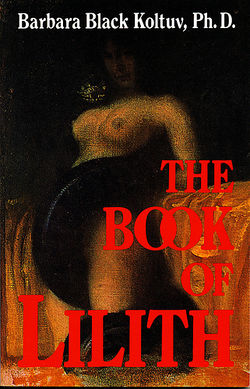On November 6th, 2024, the 9,000th article was added to the SuccuWiki!
The Book of Lilith (II)
For other uses of the word Succubus, see Succubus (disambiguation).
For other uses of the name Lilith, see Lilith (disambiguation).
The Book of Lilith is a book written by Barbara Black Koltuv.
Book Details
- Title: The Book of Lilith
- Author: Barbara Black Koltuv
- Format: Paperback
- Pages: 224
- Publisher: Nicolas-Hays
- Language: English
- ISBN-10: 0892540141
- ISBN-13: 978-0892540143
- Release Date: May 1986
Book Synopsis
Dr. Koltuv, a clinical psychologist and Jung analyst, shows the mythological she-demon Lilith as an archetypal part of the Self and helps the reader to reconnect with this powerful energy in order to transform it to themselves in this fascinating study.
Book Review
The following reviews can be found at the Amazon.com link in the External Links Below
- 2 out of 5 stars
- Nice pictures, not so great research
- Reviewed On: October 18, 1999
- Reviewed By: Renee L. Rosen-Wakeford
Although I do credit this book with whetting my appetite to research further into Lilith and I did enjoy reading it when I first started it, after I did more research myself, I realized how flawed Koltuv's research is. She makes assertions while giving no evidence (such as stating that Lilith appears in Germanic mythology, which she doesn't), and she throws a lot of non-Lilith myths, stories, etc., that are similar to Lilith but treats them as if they are actually directly connected instead of just being "archetypally" connected. She also makes the usual claim that Lilith was originally a goddess, and, per usual, gives no evidence for this assertion. This is an OK intro to Lilith book and is a fun read, but do your serious research into Lilith elsewhere.
- 1 out of 5 stars
- Worst book that I've read in decades.
- Reviewed On: October 6, 2003
- Reviewed By: "moon_shadow703"
When I picked up this book I was hoping for a summary of research about Lilith or at least a good starting place for such. I would have accepted a book that was based on psychological archetypes, or on myths and folklore, or one on historical Jewish Mysticism, or even one on modern ideas in a magico-religious community about the subject. What I read was a sloppy mixture of all of the above which was in my opinion poorly written.
The mishmash of "factoids" about Lilith were almost always presented without context. Which ever of the above categories a "fact" or offered perspective was presented- its category was not exposed (if at all) until after the anecdote was narrated, which of course interfered with the way the reader understands or digests the information. Sometimes facts of one type were in a chapter that led the reader to believe it was another type.
For instance, many of theses anecdotes which seemed to be folklore, were actually dream sequences from the psychologist author's analysands. Therefore they were dreams that people had that were Lilith-like, and not details about a real figure of myth, or a historically researchable topic of any kind. Many times the story presented was a folklore-like sequence from a play or story. Usually there was no contextual information about the author or dreamer and what exposure to the myth that person may have had.
These factoids, anecdotes, fictional snippets, and dreams (which the author may have labeled Lilith archetypes but it is unclear if the dreamer/analysands would have done so...)are presented without any clearly articulated argument, so the book proceeds without a point, and with incredibly sloppy "evidence".
I wouldn't recommend this book to anyone, and I don't want to give it even one star.
The only valuable points of interest that I found in the book were the photos of amulets against Lilith or Lillith like "night hags" and the names of the books used to research her topic. ( I don't believe that a bibliography was used either.)
